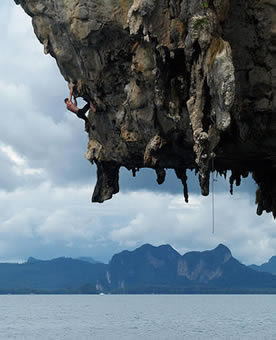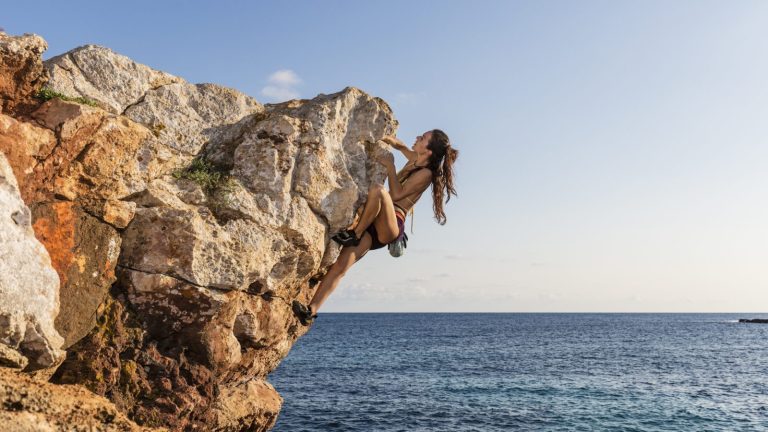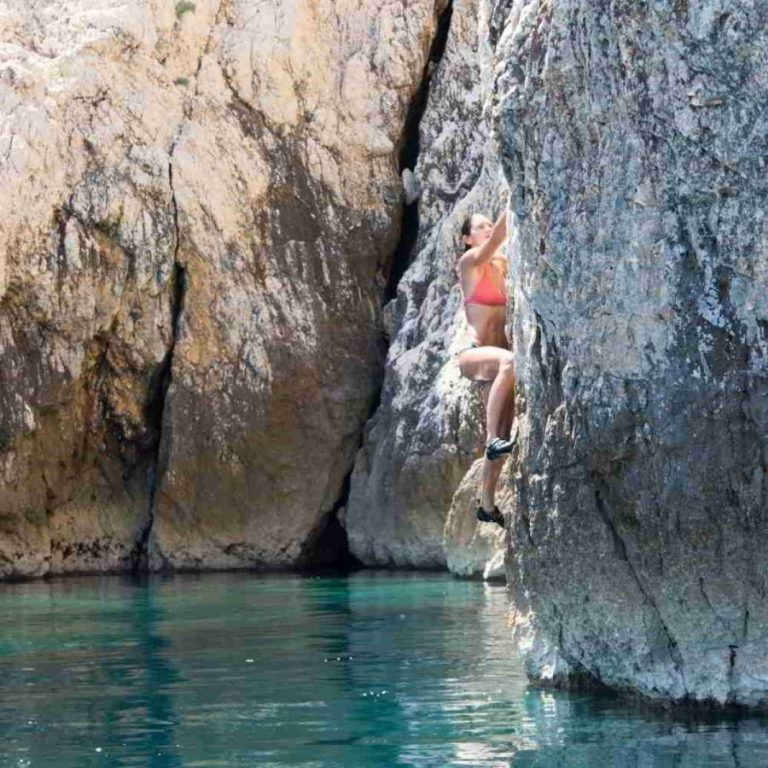Deep-water Soloing in Thailand: Where to Go and What to Expect
If you’re an adventurous rock climber looking for a new challenge, then deep-water soloing (DWS) might be just what you need. DWS is a type of climbing that involves ascending a rock face without the use of ropes, harnesses, or any other safety equipment, and then jumping or falling into the water below when you reach the top. Thailand is an excellent destination for DWS enthusiasts, with its beautiful beaches and towering limestone cliffs. In this article, we’ll explore some of the best spots for deep-water soloing in Thailand, and what you can expect when you get there.
Introduction to Deep-water Soloing
What is Deep-water Soloing?
Deep-water soloing is a type of climbing that involves ascending a rock face over water without the use of any safety equipment. In DWS, climbers rely on their physical abilities and balance to ascend the route and then jump or fall into the water when they reach the top. This type of climbing requires a high level of skill and experience, and should only be attempted by experienced climbers.
Why is Deep-water Soloing Popular in Thailand?
Thailand has become a popular destination for deep-water soloing because of its stunning beaches and towering limestone cliffs. These cliffs offer climbers a unique challenge, with routes that range from beginner to expert level. Additionally, the warm water and sunny weather make Thailand a perfect destination for rock climbers all year round.
Where to Go for Deep-water Soloing in Thailand
Railay Beach
Railay Beach is one of the most popular spots for deep-water soloing in Thailand. The beach is only accessible by boat, and the limestone cliffs that surround it offer some of the best DWS routes in the world. The routes at Railay Beach range from beginner to expert level, with heights ranging from 5 to 30 meters.
Tonsai Beach
Tonsai Beach is another excellent destination for deep-water soloing in Thailand. The beach is located near Railay Beach, and the limestone cliffs that surround it offer a variety of routes for climbers of all skill levels. Tonsai Beach is also a popular spot for traditional rock climbing, so you can combine your DWS adventure with some more traditional climbing as well.
Koh Phi Phi
Koh Phi Phi is a beautiful island in southern Thailand that is also a great spot for deep-water soloing. The island is surrounded by towering limestone cliffs that offer some challenging routes for experienced climbers. The water around Koh Phi Phi is crystal clear, and the island itself is home to a vibrant nightlife, making it a popular destination for climbers and tourists alike.
What to Expect When Deep-water Soloing in Thailand
Safety
While deep-water soloing can be an exciting and rewarding experience, it is important to remember that it is a dangerous activity that should only be attempted by experienced climbers. Before attempting any DWS routes in Thailand, make sure that you have the necessary experience and skills to do so safely. Additionally, it’s essential to always wear a life jacket and to have a spotter in the water when attempting any DWS routes.
Weather
Thailand has a tropical climate, which means that the weather is warm and sunny all year round. However, the monsoon season in Thailand can bring heavy rainfall and high winds, which can make deep-water soloing dangerous or impossible. Before planning your trip to Thailand, make sure to check the weather forecast and plan accordingly.
Gear
Unlike traditional rock climbing, deep-water soloing requires very little gear. Climbers will need to bring appropriate climbing shoes, chalk, and a life jacket. If you plan on renting gear in Thailand, make sure to do your research and rent from a reputable company.
Accommodations
Thailand has a wide range of accommodations to suit all budgets and preferences. Many of the best deep-water soloing spots are located near popular tourist destinations, such as Railay Beach and Koh Phi Phi, which offer a variety of accommodation options, including hotels, hostels, and guesthouses.
Transportation
Getting to the best deep-water soloing spots in Thailand can be a bit tricky, as many of them are only accessible by boat or require a bit of hiking to get to. However, there are plenty of transportation options available, including taxis, tuk-tuks, and longtail boats.
Local Culture
Thailand is known for its rich culture and friendly people. While you’re in Thailand, take the time to explore the local culture and try some traditional Thai food. Additionally, it’s important to be respectful of the local customs and traditions, including dress codes and etiquette when visiting temples or other religious sites.
Conclusion
Deep-water soloing is a thrilling and challenging activity that is rapidly gaining popularity among rock climbers. Thailand is a prime destination for DWS enthusiasts, with its beautiful beaches, towering limestone cliffs, and warm weather. Railay Beach, Tonsai Beach, and Koh Phi Phi are just a few of the excellent spots for deep-water soloing in Thailand. However, it’s important to remember that DWS can be dangerous and should only be attempted by experienced climbers with the necessary skills and equipment.
FAQs
- What is deep-water soloing?
Deep-water soloing is a type of climbing that involves ascending a rock face over water without the use of any safety equipment.
- Is deep-water soloing dangerous?
Yes, deep-water soloing can be dangerous and should only be attempted by experienced climbers with the necessary skills and equipment.
- What gear do I need for deep-water soloing?
Climbers will need to bring appropriate climbing shoes, chalk, and a life jacket.
- What is the best time of year to go deep-water soloing in Thailand?
Thailand has a tropical climate, which means that the weather is warm and sunny all year round. However, it’s important to check the weather forecast before planning your trip, as the monsoon season can make deep-water soloing dangerous or impossible.
- What else is there to do in Thailand besides deep-water soloing?
Thailand is home to a vibrant culture and plenty of other activities, including traditional rock climbing, hiking, and exploring the local cuisine and culture.


